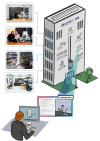Differences
This shows you the differences between two versions of the page.
| Both sides previous revisionPrevious revision | |
| research:ispl [2012/10/31 16:18] – [Intelligent Systems in Production & Logistics] mga | research:ispl [2015/01/14 08:30] (current) – [Intelligent Systems in Production & Logistics] cowley |
|---|
| In recent years, the complexity and dynamics in logistic processes have increased due to shorter product life cycles, the rising number of product variants as well as the growing number of transnational links and dependencies within the production processes between companies. | In recent years, the complexity and dynamics in logistic processes have increased due to shorter product life cycles, the rising number of product variants as well as the growing number of transnational links and dependencies within the production processes between companies. |
| | |
| The research group //Intelligent Systems in Logistics// develops approaches and methods for controll, modeling, simulation and evaluation of logistic processes in order to optimize the planning and controlling processes of logistic service providers. The goal is to improve the service quality while ensuring cost- and time-efficiency as well as sustainable production and transport processes within the supply network of companies. | The research group //Intelligent Systems in Logistics// develops approaches and methods for control, modeling, simulation and evaluation of logistic processes in order to optimize the planning and controlling processes of logistic service providers. The goal is to improve the service quality while ensuring cost- and time-efficiency as well as sustainable production and transport processes within the supply network of companies. |
| |
| The research field covers planning and scheduling algorithms, (distributed) decision making, multiagent systems and interaction, distributed artificial intelligence, knowledge management, data mining, and simulation-based reasoning. New approaches, algorithms, and interaction mechanisms are evaluated with the [[http://plasma.informatik.uni-bremen.de/|PlaSMA Simulation System]] as well as directly with production robots in cooperation with the [[http://www.logdynamics.de/?&L=1 |BIBA]]. The PlaSMA Framework enables the simulation of logistic scenarios on real-world infrastructures. It provides a discrete time simulation that ensures a correct conservative synchronization with time model adequacy, causality and reproducibility. | The research field covers planning and scheduling algorithms, (distributed) decision making, multiagent systems and interaction, distributed artificial intelligence, knowledge management, data mining, and simulation-based reasoning. New approaches, algorithms, and interaction mechanisms are evaluated with the [[http://plasma.informatik.uni-bremen.de/|PlaSMA Simulation System]] as well as directly with production robots in cooperation with the [[http://www.logdynamics.de/?&L=1 |BIBA]]. The PlaSMA Framework enables the simulation of logistic scenarios on real-world infrastructures. It provides a discrete time simulation that ensures a correct conservative synchronization with time model adequacy, causality and reproducibility. |
Prof. Dr. hc. Michael Beetz PhD
Head of Institute
Contact via
Andrea Cowley
assistant to Prof. Beetz
ai-office@cs.uni-bremen.de
Discover our VRB for innovative and interactive research

Memberships and associations:



Social Media:














